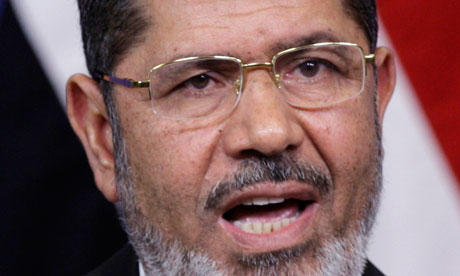Mohamed Morsi goes to UN general assembly with independence in mind
Egypt's first democratically elected and Islamist president takes first trip to US keen to redefine international relations

Mohamed Morsi, the Egyptian president, will be under the spotlight during his trip to the UN general assembly in New York. Photograph: Virginia Mayo/AP
The UN general assembly, which opens in New York this week, is notable for the cast of leaders it draws to the city. This year, it is Mohamed Morsi, who will be the most closely watched, as he embarks on his first visit to the US as president, at a delicate time in relations between America and the Islamic world.
Morsi, who will meet David Cameron and French president François Hollande but not Barack Obama – has left the US leadership in no doubt that relations have entered a new era. America was angered by his dilatory response to the attack on the US embassy two weeks ago.
On his official Facebook page the president said: "Egyptian foreign relations are now about a balance with other nations based on mutual respect and interests. We open doors and do not close others."
An MP from Egypt's dissolved parliament for the Brotherhood's political arm, the Freedom and Justice party, Mahmoud Helmy, told the Guardian, "The president's visit is primarily about Egypt's interests, and we trust Morsi to do that. He's trying to set foundations for mutual interests and improving relations to a level that was lost with the previous regime, which was more of a stooge."
Elijah Zarwan, a Cairo-based fellow at the European Council on Foreign Relations, said: "Morsi and Obama have compelling shared interests in keeping the Egyptian-US relationship strong, and have already moved to mend fences after last week's tensions, which I suspect will be a flash in the pan. US relations with Mubarak were sometimes prickly. Relations with Egypt's first democratically elected and Islamist president may also be, but for different reasons."
Morsi is catering to public opinion in Egypt by making it clear that he is his own man when it comes to foreign relations. Choosing to visit Iran, the first visit by an Egyptian leader in 30 years, he then went on to publicly criticise the Syrian regime, in Tehran to the chagrin of its staunchest regional ally.
And in the wake of the embassy attacks, he also had to contend with local uproar at the American film which triggered the anger.
"The embassy events are not the first nor the last flash points that may happen, and they will not influence relations between two countries so markedly," Helmy said. "We announced that we don't accept the offense to the Prophet Mohammed and we also condemn the violence and attack on the embassy. Any foreigner in your country is your guest and you are responsible for his safety."
And despite the events in Cairo having implications on the US presidential race, Morsi does travel to the US with a merit of goodwill, according to Bassel Adel, member of the secular liberal Free Egyptians party. "Morsi goes to the US with a card up his sleeve that the Brotherhood didn't participate in the embassy protest, for the first time in their history. Also events in Libya [where the US ambassador was killed after an attack on the consulate] overshadowed the events in Cairo."
However, Adel alluded to a unique relationship that the Brotherhood has with the US administration, going back to the early days of the revolution that ousted Mubarak. "Egyptians not belonging to the Brotherhood feel there is a special relationship between the Brotherhood and the US, adirect line of communication that began with the onset of the revolution. This is something that needs to be looked into."
No comments:
Post a Comment